Today we review the ThieAudio Oracle MKII Tribrid In-Ear Monitors, retailing for $589 USD.
Disclaimer: Linsoul sent us the ThieAudio Oracle MKII for this review, free of charge. As always, I am here to convey my honest experience with the product.
ThieAudio
ThieAudio is a company that specializes in the research & development of audiophile in-ear monitors as well as headphones. The brand was established in 2019 as a creative endeavour by Linsoul. According to their statement, their goal is to serve as a creative platform by bringing together the best teams of engineers to design & manufacture high-performance, high-end audiophile products. Their statement continues by saying that they hand-select the most innovative and renowned engineers in their respective fields to oversee product design, engineering, and manufacturing for each project. In a brief period of time, they managed to become a great company that designs products for every price range on the market.
You can find the rest of our ThieAudio reviews, here.
ThieAudio Oracle MKII
The Oracle MKII is one of ThieAudio’s latest releases. According to the team, it debuted as a follow-up to the first-gen Oracle and has improved and enhanced with more refined tuning. ThieAudio engineers say they adopted the same Knowles balanced armatures used in the Monarch MKII, aiming to deliver a similar, colorless, neutral midrange. Since we reviewed the Monarch MKII some time ago and already know how great it sounds, I was immediately excited by this news.
The Oracle MKII is priced at 589 USD through Linsoul. The Oracle MKII is sold with two different faceplate designs, and you are expected to choose which design you want at the time of purchase. The one I received features the ‘Black Scarlet’ faceplate, which looks more monolithic with the shell. I also think the ‘Tiger’ faceplate looks fantastic with its layers of color and depth effect. ThieAudio is upping its game on aesthetics with each and every pair of these gems, as they all look wonderful. The MKII comes with a resin shell and metal nozzle, similar to the first generation. The driver configuration looks unchanged from the outside, but ThieAudio states that both the crossover and the drivers have been updated.
Specifications
Driver Configuration: 1DD+2BA+2EST + 3-way Crossover
Socket: 0.78-2Pin
Housing: Resin Body, Metal Nozzle, Artisan Faceplate
Cable: 1.2m, 4-strand 26 AWG SPOCC Cable with 2.5/3.5/4.4mm Interchangeable Connectors
Impedance: 11Ω
Sensitivity: 100dB @1kHz
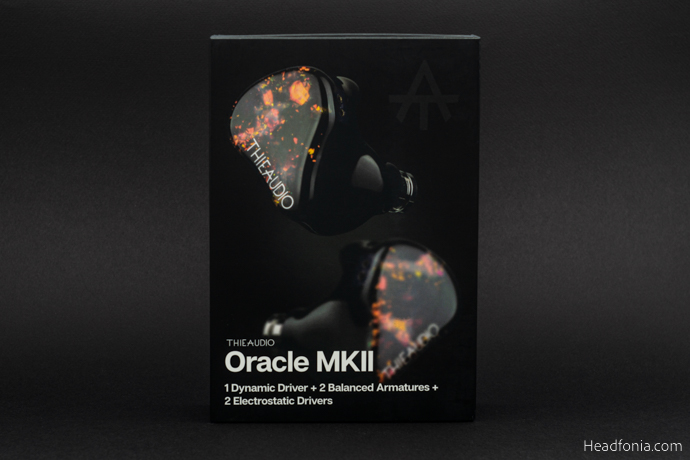
Packaging & Accessories
ThieAudio Oracle MKII comes in a medium-sized cardboard box. The box features a picture of the earphones on the cover and specs about the earphones on the sides. A carrying case is right next to the compartment that holds the in-ear monitors in place. The carrying case is similar to the one from Monarch MKII’s package. As I mentioned, this case doesn’t suit these excellent-looking earphones, and I’d like to recommend a more functional and slightly smaller case, as Yanyin or 64Audio have done.
Let’s take a look at the accessories. Oracle MKII comes with a cleaning cloth, three pairs of foam ear tips, three pairs of silicone ear tips, and a litz cable with interchangeable ends. The new litz upgrade cable is silver-plated OCC and 26-AWG thick. It features a dark cable jacket and a different braiding style than usual. It feels pretty ergonomic and flexible at the same time. The interchangeable system works quite well and utilizes a 4-pin inner layout. The Oracle MKII comes with 2.5mm, 3.5mm, and 4.4mm connectors, ready out-of-the-box.
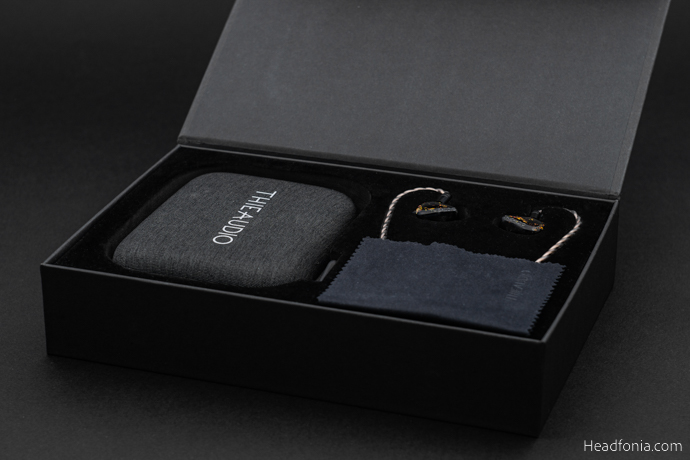
I like the cable’s build quality; I especially appreciate the fact that it comes with lighter and more compact connectors compared to the Monarch MKII’s. Using a thinner sheathe instead of fabric and the different braid style has contributed significantly to the ergonomics as the cable is flexible. In addition, the cable tie on the cable is a nice touch. As for the quality of the tips, they look like they’re the same as other ThieAudio earphones, but for $500 and up, I think a different set of tips should be offered. I’d like to see ThieAudio innovating beyond the shell. Before moving on from this section, I’d like to mention that I appreciate the inclusion of the interchangeable upgrade cable. It triple-folds compatibility and helps us audiophiles who have multiple sources.
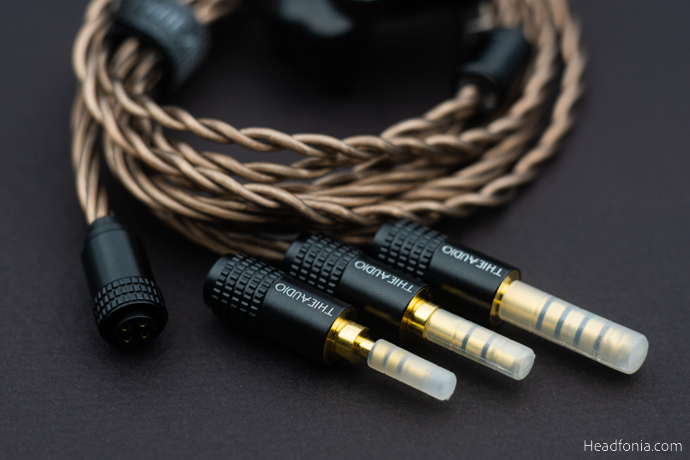
Design, Build & Fit
The Oracle MKII utilizes a resin shell, similar to ThieAudio’s other mid to high-end products. Its nozzle is made of metal and adopts a fine mesh filter. The nozzle is 6mm wide, so you need to take this into consideration if you are planning to use aftermarket tips. Wide stem ear tips like JVC’s Spiral Dots fit well. The shell shape is specifically designed to support the antihelix of your ear and is designed to sit ergonomically on the inside of your ear, which we call the concha area. The shell size can be classified as medium. It is not a huge earphone, but it is not particularly small either. It is slightly smaller than the Oracle first-gen.
The build quality is excellent, and I couldn’t see any workmanship defects. The part connecting the nozzle to the body and other joint points looks flawless. As for the faceplate design, the Oracle MKII sports a darker color palette compared to Monarch MKII and other tribrids that we reviewed. The ‘Black Scarlet’ faceplate design features shimmering flakes that glow with a red and orange hue under a light source. In addition, the brand name can be found in chrome lettering on both of the faceplates. There is also a vent on the side of the shell, most likely for the 10mm LCP dynamic driver inside. Overall, Oracle MKII has an aesthetic design and feels durable with its medical-grade UV resin shell.
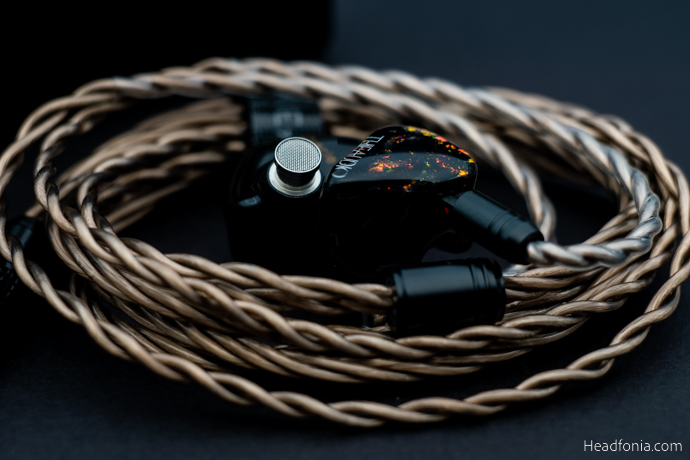
Oracle MKII provides good passive isolation and is very comfortable to wear thanks to its shape optimized to the ear anatomy. Even after long listening sessions, there was no irritation or pain, and at one point, I even forgot I was wearing the IEMs. The comfort is also greatly enhanced by the new cable’s braid style (or lack thereof) and ergonomics. Overall, the fit and comfort are excellent, and most people will have no problem wearing this gemstone without complications.
The review continues on the next page. Click here or use the jump below.
Page 1: ThieAudio, Oracle MKII, Packaging & Accessories , Build Quality & Design
Page 2: Sound, Low, Mid, High, Technical Capability, Comparisons, Last Words







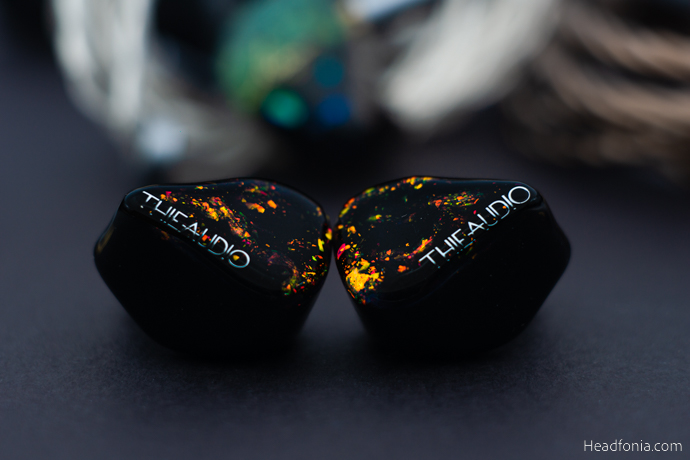

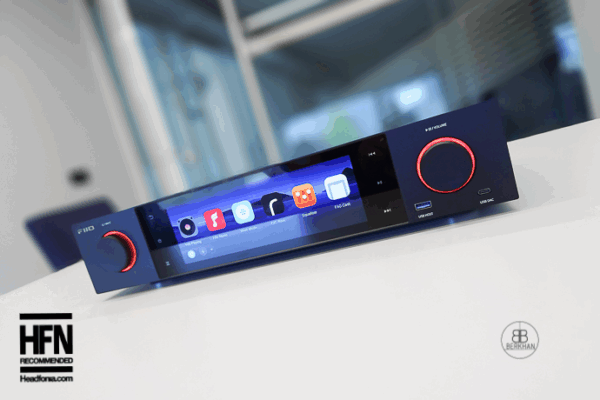
mhd
is it a good pick for metal genre despite the elevated upper mids? what is your recommendations for technical metal under 600$?
Yagiz
Yes. This is as good as it gets at this price point. Select your source accordingly and all will be well!
Tej
I wonder if the ISN EST50 would be a better direct comparison? Significantly cheaper, albeit without modular connectors.
Dima
I have this model and really enjoy them. So, I would like to ask Yagiz and community, whether Monarch MK2 worth extra buck? And does it make sense to have both models in collection?
Yagiz
Hello Dima,
If you had asked this question without buying anything I might have told you to buy the Monarch MKII, but the Oracle MKII is a very good IEM and after listening to it you might not think it’s worth the nearly 2x price difference if you switch to the Monarch MKII. As always, the laws of diminishing returns come into play here. IMO, it doesn’t make much sense to upgrade from Oracle MKII to Monarch MKII at a loss. It is a wonderful IEM that punches above its weight.
Happy Listening!